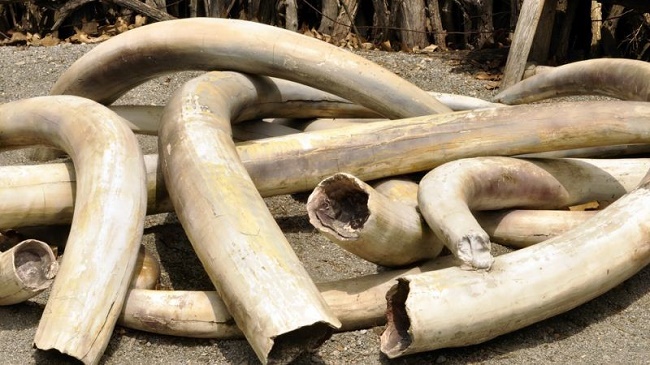The Wildlife Justice Commission (WJC) has published a new report revealing a remarkable and sustained disruption in the trafficking of pangolin scales and ivory from Africa to Asia.

Titled “Disruption and Disarray: An analysis of pangolin scale and ivory trafficking, 2015–2024”, the report documents a sharp decline in significant seizures since 2020, pointing to a shift in the criminal landscape and the potential long-term impact of targeted law enforcement efforts.
The report draws on seizure data, open-source research, and the WJC’s own criminal intelligence and investigation findings over the past decade.
It highlights a turning point in 2020, when seizure volumes dropped dramatically – largely attributed to the global shock of the COVID-19 pandemic. Notably, this decline has held steady, suggesting more than a temporary disruption.
In addition to the pandemic’s impact, recent intelligence indicates that sustained, targeted law enforcement operations – including key arrests and prosecutions of high-level traffickers – have contributed to a weakened criminal capacity, particularly at the supply side in Africa.
“This significant reduction in the trafficking of pangolin scales and ivory is a testament to the critical impact of focused and collaborative law enforcement efforts. As our new report shows, proactive targeting of kingpins and high-level traffickers, strategic arrests, and strong international cooperation have fundamentally disrupted criminal networks operating at an industrial scale. Our partnership with the Nigeria Customs Service demonstrates how sustained pressure at key trafficking hubs can have a ripple effect across the global supply chain. By continuing to apply strategic pressure on the crime bosses and financiers who drive this illicit trade, we can build on this momentum and create lasting change in the fight against transnational wildlife crime”, said Olivia Swaak-Goldman, Executive Director of the WJC.
Criminal dynamics and evolving patterns
The report compares trafficking patterns in the pre-pandemic (2015–2019) and post-pandemic (2020–2024) periods, drawing on seizure data, open-source research, and WJC criminal intelligence. Among the key findings:
1. A substantial decrease in the number of multi-ton seizures of pangolin scales and ivory since 2020.
2. A shift toward major interceptions taking place in African countries prior to export.
3. No significant pangolin scale seizures reported at any seaport for the past three years – a strong indicator of disrupted supply chains.
4. Continued evidence that organised crime networks have diversified their operations to adapt to changing market dynamics and law enforcement pressure.
5. Ongoing seizures of pangolin scale stockpiles in Nigeria, suggesting persistent criminal investment despite declining export flows.
6. The decline in seizures may reflect improved enforcement but also highlights a significant intelligence gap — it remains unclear whether trafficking has decreased or if shipments are now evading detection entirely.
A strategic tool for law enforcement and policymakers
The purpose of the report is to share up-to-date findings and provide a current assessment of the criminal dynamics and changes in the trafficking landscape, with the goal of helping to inform law enforcement strategies and policy decisions. By understanding these shifting patterns, authorities can ensure that the global response remains appropriately targeted to current and future needs, and that gains made in disrupting illegal trade are not reversed.
Building on its investigative experience, the Wildlife Justice Commission puts forward a series of targeted recommendations to further disrupt trafficking networks and reduce the risk of crime displacement:
Key recommendations:
- Prioritise the dismantling of high-level criminal networks: Identifying and targeting the crime bosses, financiers, and brokers who control supply chains.
- Deepen long-term, intelligence-led investigations: To penetrate complex networks, corroborate intelligence, and gather robust evidence.
- Target the profits of crime: Through financial investigations and asset forfeiture, to remove the incentives that sustain trafficking networks.
- Enhance international cooperation: Joint investigations and intelligence sharing are essential to dismantle networks operating across multiple countries.
- Involve prosecutors from the start: Early engagement ensures strong legal cases and increases the likelihood of successful prosecutions.
Celebrating 10 years of impact
This report also marks a significant milestone for the Wildlife Justice Commission. In 2025, the group celebrates its 10th anniversary.
For a decade, the WJC is said to be on the frontlines of the fight against wildlife crime — conducting intelligence-led investigations and supporting law enforcement agencies around the world.
“But the fight is far from over. This report reflects both the progress made and the challenges ahead in the global effort to dismantle the criminal networks threatening wildlife and ecosystems.”
A global effort
The Wildlife Justice Commission says it remains committed to supporting law enforcement agencies, and governments in tackling transnational wildlife crime, adding that the findings in the report serve as a call to action for continued international cooperation and strategic investment in the tools and partnerships that have proven effective in disrupting organised criminal activity.
